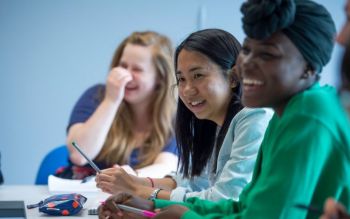View Experience Sussex! articles from previous issues and catch up on anything you’ve missed.
Top tips to help you speak in your seminars
Posted on behalf of: Student Communications
Last updated: Monday, 7 February 2022

Seminars provide students with an opportunity to explore topics and to identify and solve any questions and misunderstandings. Students can ask queries, discuss ideas and listen and respond to alternative points of view.
However, for a seminar to work there needs to be group interaction. Each individual member has a responsibility to make this happen. And if this doesn't occur, you may leave a seminar with more questions than answers!
In this article, we give you some tips to grow your confidence and become an active member of your seminars group:
Preparation is key
- Make sure you do the seminar reading – or as much of it as you can manage!
- Set up or join a reading group. This will help you gain confidence, talk about points you all want to raise and share notes and ideas.
- Make notes – not just of facts, but also of points you need to clarify or have questions about. What you don’t understand or agree with often generates the best discussions.
- Write down the exact wording of the comments you want to make. Sometimes, it's easy to forget what you were planning to say, particularly if you are feeling nervous, so having a ‘script’ can be really helpful.
Speak early
- The sooner you speak, the sooner you are a participant.
- The longer you wait, the harder it is to speak.
- The longer you wait, the greater the chance that someone else will say what you wanted to say!
Help others to speak
Making a seminar work is a collective responsibility so helping others to participate will improve your overall learning experience:
- Ask other members if they have something to add when you have finished speaking.
- Respond to other people's comments.
- Ask for clarification when needed.
- Ask questions for other members to answer.
- Allow time for other people to contribute
- Ensure you benefit from the diverse community in the seminar: students from other countries and backgrounds may have different and interesting perspectives. Listen and understand – even if you do not all agree!
